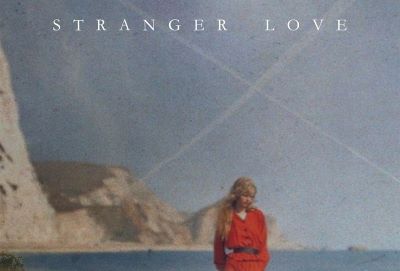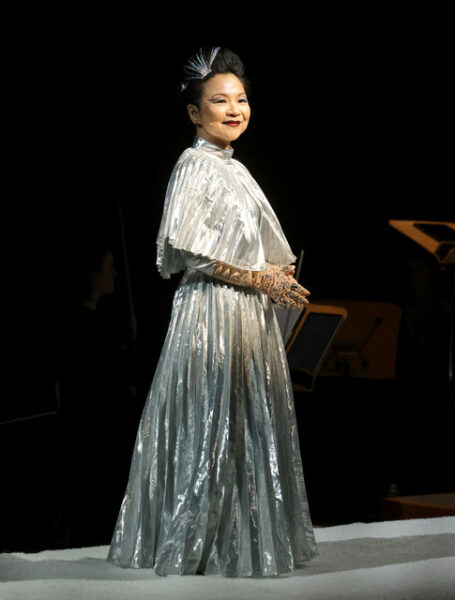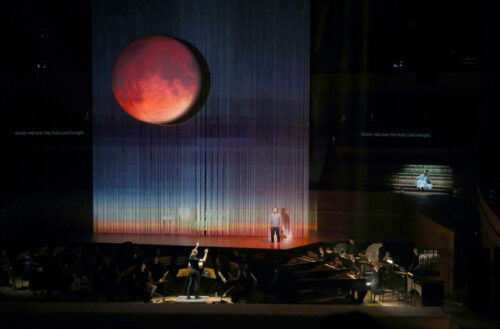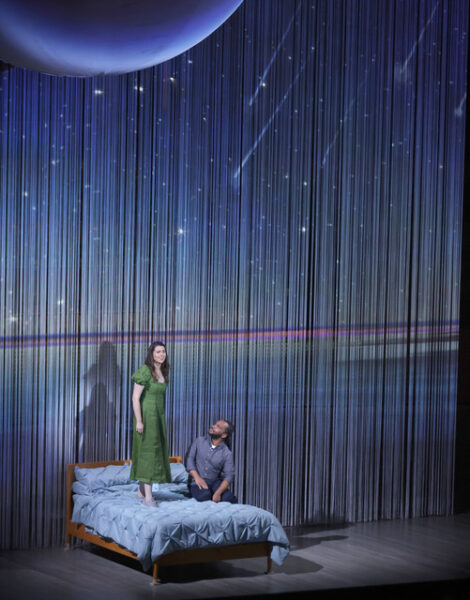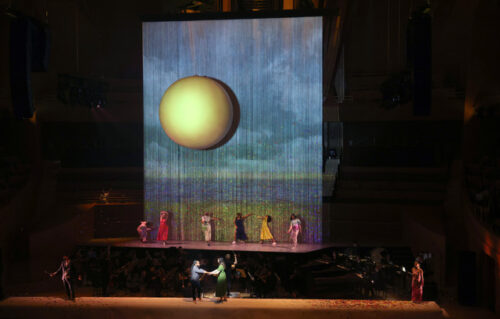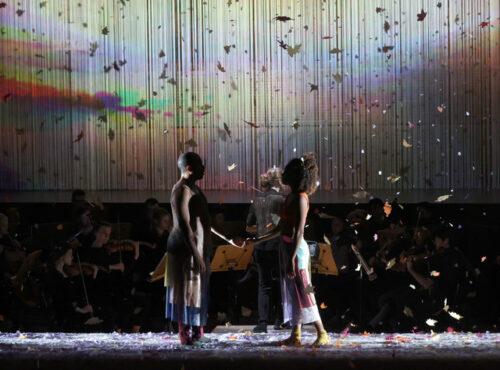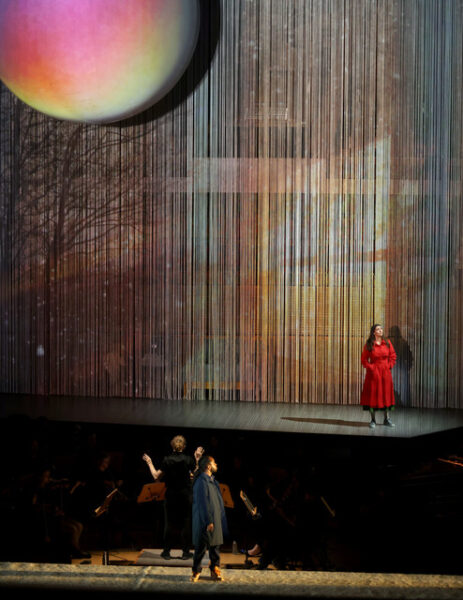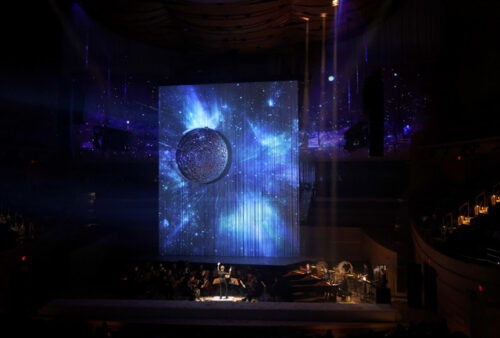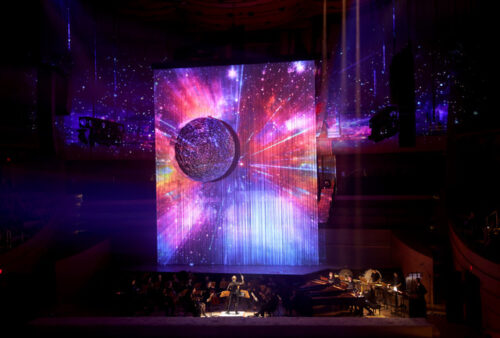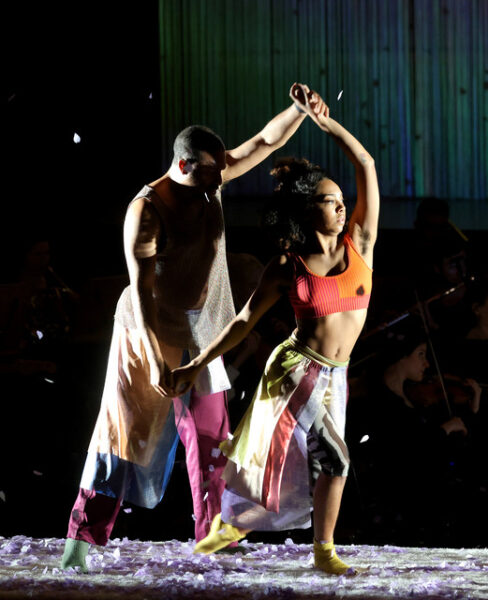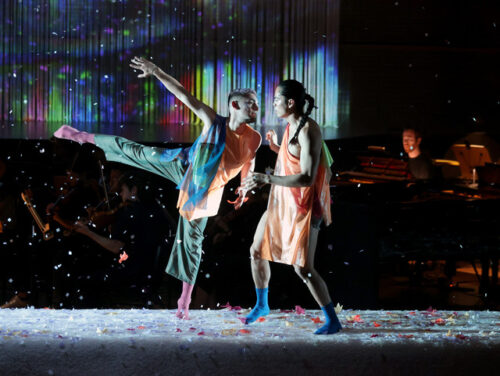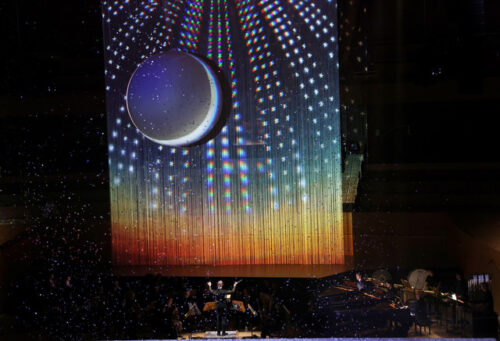STRANGER LOVE, OR MINIMALIST MELATONIN
Composer Dylan Mattingly calls his six-hour Stranger Love an opera in three acts, but it’s more like a set of three distinct pieces: an opera (Act I, 230 minutes), a ballet (Act II, 80 minutes), and an orchestral piece (Act III, 25 minutes). It premiered Saturday May 20, 2023, at Walt Disney Concert Hall to an audience that shrank throughout its entire six-hour presentation (plus an hour-long dinner break).
The opera (that is, Act I) begins with Julyana Soelistyo (The Host aka “Uriel”) in an extravagant silver gown (by costumer Kaye Voyce) evoking star people, setting the tone for a lengthy leisurely voyage by instructing us that we don’t need to know anything beforehand: “Just listen,” she says, sounding like HAL from 2001: A Space Odyssey. Then the music of the lively Spring section begins with three microtonally dissonant pianos, three xylophones and three prominently featured singers aahing and oohing from the “pit” (3×3: very Masonic). Vocally, the singers — Holly Sedillos, Catherine Brookman, and Eliza Bagg — sounded great, but who needs to know if vowels or consonants are involved? The repetitive strains on piano were amazingly executed by Milena Gligic, Paul Kerekes, Mikael Darmanie and Daniel Schreiner, and the hard-working percussionists were Matt Evans, Amy Garapic, and Robby Bowen. One thing I liked in Stranger Love is that the microtonal piano parts sounded so cheery and optimistic. Too often, microtonal music is musical asparagus that has been cooked too long. Leading the band was the striking conductor David Bloom. With sandy-blonde hair in a man-bun, the entrancing Bloom never flagged, and at one point I caught myself staring at his beautifully precise work for over ten minutes. His orchestra, the 23-member Contemporaneous from New York, is truly astounding. While the band’s mission is “to bring to life the music of now,” all I longed for was the music of then.
After a quarter-hour of Philip Glass-wannabee opera minimalism, it sank in that the entire day was going to be a slog. (Thankfully, there was a chamber arrangement of strings, reeds, and brass, which added some much-needed variety.) This is when the questions began: Who commissioned this world premiere soporific failure? (Oops, the Los Angeles Philharmonic.) What am I going to have for lunch? Say, wasn’t Mozart was a Master Mason? How am I going to survive six hours of this self-indulgence? Why is this kind of music commissioned, since it’s clearly fun for the composer, players, and actors, but abusive to the audience? Would it have been more fun to do laundry? These were the kinds of queries I had for the first two hours. Those questions may seem irrelevant, or even insulting, but the repetitive music, director Lileana Blain-Cruz‘s sparse staging, and aural shortcomings failed to keep me involved for any significant length of time. (By the way, Ms. Blain-Cruz directed The Skin of Our Teeth at Lincoln Center, and the night I saw that three-act snoozefest, most of the audience walked out as well.)
The joyous, dense noodling would make any fan of the Johns (Adams and Corigliano) feel at home — yet no matter how busy their music gets, the vocals are always clear and easy to understand. In this amplified production, with the singers wearing ugly face microphones, the vocals were buried deep in the mix. The classically trained opera singers, especially Soprano Molly Netter, fared poorly. Her gentle attacks and careful technique meant that we could understand only the middle letters of each word. A good choice of casting and the best of the singers was Isaiah Robinson. His plainer style of singing, more suited to pop than opera, sharply cut through the orchestra, allowing us to make out maybe half his words (you can only do so much when the mixer isn’t helping).
Here’s the kicker: Thomas Bartscherer‘s sung text was projected stage right and left above the choral benches. The opera is written in English. Sung in English. So why must I rely on projected words in order to understand singing in a language I understand? Even so, from Terrace East where I sat, I had to crane my neck to see the lyrics, so I got up no less than three times to see them from a different viewpoint. After, I don’t know, two hours (one lyric invited us to “hold Eternity in an hour”; that’s an understatement), I moved down to the orchestra. It was then I realized that with the non-existent plot and esoteric wording, there was no need to even look at the supertitles anymore. At one point, “Zenaida macroura” flashed on the screen. WTF? Later, I found out it was the scientific name of a dove. Why, I oughta…
The stage of Walt Disney Concert Hall was divided into three areas by scenic designer Matt Saunders. A raised, padded, fabric-covered, off-white catwalk ran along the lip of the stage. Behind it was the orchestra, and behind them, the rear of the stage was raised. This is where the bulk of the action took place. Upstage, a projection screen made of fringe-like rope ran from the ceiling to the floor. A giant white sphere hung in front of the screen. The Host, who preferred to exist between orchestra and characters or some nonsense, sat in the choral benches, delivering monologues (I couldn’t even see her from Terrace East when she sat stage right). In the Spring section, six dancers walked (not danced, walked) in a large circle around the orchestra while Robinson (as Andre) and Netter (as Tasha) stood still on opposite sides of the stage, looking unsatisfied yet destined to be together. The projection was an abstract Spring landscape. The program notes said that this was supposed to be a garden party (shouldn’t that have been in the libretto?), at which point I stopped reading the insert. I was no longer in the mood to read anything explaining the production.
Everybody slowly walked in a circle — solo or in pods — for the better part of an hour before our lovers Andre and Tasha finally met (there are no other named characters). Then it was Summer, where the lovers got on bed with their clothes on and sang a wordless, ecstatic love duet while looking at the stars. The lush music soared, but its repetitive, entrancing nature lulled me to sleep multiple times. At the end of the Summer section, The Host told us that it was time for a “brief pause.” For an audience trained with “Please stay seated during this brief pause” across the street at Los Angeles Opera, there was briefly general confusion as to whether or not this was — at ten minutes — a pause or an intermission. (What we needed was a a leave of absence. Or some cocaine.)
Then it was time for Autumn, the section where the cracked plot turned into plate tectonics. It picks up where Summer ended with the two still in love, but then a muse-like Bird in green high heels and a fabulous knee-length coat made of hot-pink flowers told Tasha that she should leave Andre and go follow her dream of a writing career. So she grabs her roller suitcase and happily splits. This leaves Andre sad. The Bird tells him to go traveling in search of the proof of God or some junk, and he’s all like, “Fine, I guess I’ll go.” I was expecting them to break up. After all, Winter is coming. But I did not expect it to be so glib.
Now, usually in this kind of story, both Boy and Girl pursue their separate and incomplete lives apart. However, The Girl’s departure is the last we see of her until the reunion. Instead, we spend the next hour or so with Andre muddling through as he visits religiously significant places filled with Meaning.
If you’re a regular to LA Phil’s Green Umbrella series, then you’ve sat through pieces that play with silence and our patience. That was the Winter section. for which I was now wide awake. Maybe it was the music’s unsettling, thin tension and uncomfortable silence. Or maybe it was the small nap I took during Summer. The guy next to me said, “We thought it would be more experimental since it’s part of Green Umbrella.”
Anyway, the lovers reunite and declare that yes, they actually are meant for each other. Then they go buy a cabin or something where it gets cold (I’m pretty sure somewhere I heard about something in Buzzard’s Bay) and sit outside in two wooden chairs. At this point, The Host tells us that tragedy strikes, causing their love to die, but doesn’t say what the tragedy is. What happened? Is the death of their love the tragedy? Or is Winter the tragedy? Is the tragedy that their affection toward each other is bound to the weather? (We all know by now what the real tragedy is, all six hours of it.)
Speaking of which, along comes someone I call “Mr. Gloomy,” because he persuades the couple to be, well, gloomy. The lovers don’t talk to each other. They stay seated and glacially raise their blankets to their shoulders and back down. The music, as repetitive as ever, slows to silence, only to briefly pluck here and there. Similarly, the singers wait ten seconds between each syllable. I timed it. Over 30 seconds to sing “a-ban-doned love” over and over, an instance where I got impatient and read the supertitles. I don’t remember exactly how the Winter section ended. Only a vague feeling that it died a quiet, cold death, leaving what felt like a definite ending — and an exhausted audience.
But then the music of Spring suddenly returned, more energetic, excited, chaotic, and louder than before. The cast skipped along the catwalk, seeming to acknowledge the audience. The music sounded like a finale, too cheery to be part of the opera proper. It looked like a curtain call, the kind you’ll see on Broadway where the cast continues to perform instead of taking formal bows, leading into an encore. Many, including me, took this to be that kind of curtain call and began to applaud with trepidation.
Instead, this was the Second Spring section! At least 30 minutes were left. The “dancers” returned to circle the stage and the lovers were again alone, destined to meet. It felt like the end of Twilight of the Gods, where everything resets to begin again. During this exuberant explosion of life, The Host, The Bird, and Mr. Gloomy came on stage to fire handheld confetti cannons. It was a genuinely exhilarating moment, validating the torture we endured in the previous three hours. But the staging continued to mirror the unchanging repetition in the music. While the first bursts of confetti were thrilling, the three performers popped again and again, with no variation in movement. The music here was so strong that it didn’t hurt so much, but that wasn’t the case when it came to the final finale.
Some fragments of conversation during dinner break: “It could’ve been Stockholm Syndrome. I was ready to leave, but then I got into the zone.” And this from a famous composer: “It was like Tristan and Isolde followed by Parsifal.”
For dinner, there were two food options outside: a sushi truck and a taco stand. I opted for tacos, but there were over 50 people in front of me and the stand was manned by two people. We had one hour and the line wasn’t moving, so I surrendered and went to the café inside Disney Hall. For the $31 entrée, you get a small chicken breast with green salsa, limp steamed vegetables, and Mexican rice with hard bits. The server asked, “Would you like the bread?” “What kind of bread?” “It has cranberries.” (Or maybe it was raisins’¦) “Uh, no’¦” “Yeah, I don’t know why they keep giving it to us,” he said, similarly disappointed in the bread.
With dinner break over, I sat down and noticed that many people in the audience fled. Famous Composer left. Mr. I-Am-Sleeping-Through-This-Garbage next to me left. Ms. I-Know-The-Costume-Designer in front of me left. There was a steady trickle of people abandoning the theater throughout the entire opera, and it didn’t stop with the dinner break. Stranger Love never stopped the bleeding.
The lights dim and I’m ready to learn what happens to our lovers. Will they stay together? Did they learn anything? Will their spirits transcend their bodies and reach the infinite core of the universe?
NO.
Act II is a ballet. The opera is over. It features none of the principals or story from Act I. Instead, it is a kind of retelling of the opera.
The ballet begins with a new arrangement of the Summer love duet, although it’s now Spring. The projection art is the same as before, only with severe chromatic aberration added. It was like a distorted version of the opera. The dancers were placed around the hall. They slowly writhed and did who-knows-what as they made their way to the stage. Confetti — shaped according to the season (bright colors for Spring, leaves for Fall, snow for Winter) — blows down from the ceiling for over an hour. It’s a blizzard. The Hall’s HVAC system had been on full-blast all day, I guess because of the constantly running fog machine, but the addition of confetti made quite the racket. Frankly, watching confetti come out of the blowers was more interesting than whatever the dancers were doing.
Once the dancers finally made it to the stage, they eventually paired off into lovers. It was basic lover’s choreography that happens when there’s no inspiration, no scenery, no plot, and extremely repetitive music. Now in the fifth hour, I was losing patience and wanted something interesting to look at, or a hook to bring me back into the music. Instead, the music ventured into sustained, taut droning, which had the added effect of calling attention to the fact that my dinner was mostly water. After a visit to the bathroom, I was simultaneously pleased and disgusted that I didn’t miss anything. Only a droning bass line was added in my absence.
Act III was an orchestral piece consisting of new music that implied some grand cosmic something or other. The projection, reminiscent of starfield screen savers, expanded beyond the rope screen onto the walls above the Orchestra View section. The sphere rotated to reveal the back half is covered in crumpled aluminum foil. The music was the same few measures over and over, with barely any discernible variation. At first, it was overwhelming. We’re finally here at the finale! A few people around me got genuinely excited. One guy nearby was rocking out, totally getting into it and calling attention to himself. But even he lost enthusiasm and energy, eventually sitting still as the music kept repeating and not adding anything new. And then after seven hours, the show had the nerve to not end on a real banger. (But I went out humming the confetti.)
The staging of the premiere of Stranger Love did a real disservice to the music. It was as if Ms. Blain-Cruz went to the Robert Wilson school of theater and the only thing she learned was that everything needs to move slowly in front of minimal scenery. Missing were breathtaking visuals and mesmerizing dancing (choreography, or rather, movement, was by Chris Emile). How do you expect to create the next Akhnaten or Einstein on the Beach? What we got was simply not enough to keep up with the music or its ideas, which involved a journey over space and time. And when you are in a thrust space, Ms. Blain-Cruz, try not to stage for proscenium (I saw the crumpled foil on the ball from Orchestra East).
Heard after curtain call in the orchestra section: “Well, I endured it. But never again.”
On the way out, the ushers handed everyone posters for the performance. The backside is a takeoff on a Dr. Bronner’s soap label. Instead of Bronner’s philosophy, including the All-One-God-Faith and Moral ABC, there’s stuff about Greeks, The Infinite and Dreams. All we got was ideas and musings.
photos by Craig T. Mathew/Mathew Imaging
